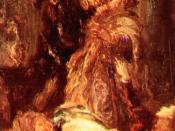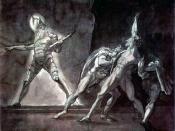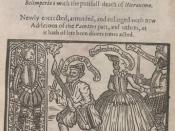The Revenge of Prince HamletShakespeare's, Hamlet, is a wonderfully written play that has many tangled webs of lies, betrayal, and revenge. The play starts off with the death of Hamlets father, the king. One night Hamlet sees the ghost of his dead father. The ghost speaks to Hamlet and tells him that he was killed by Claudius. Claudius, who is Hamlets uncle, has recently become the new king and as well married Hamlets fathers wife, Gertrude. Prince Hamlet devotes himself to avenging his fathers death, but because he is contemplative and thoughtful by nature, his heart is not fully in the deed, and he delays, entering himself into a deep depression and strong apparent madness. Hamlets quest for revenge leads him on a long journey of deception and eventually his own death.
Hamlet himself feels that he is slacking on his vengeance. He explains that "...all occasions do inform against [him] and spur [his] dull revenge."
(Act IV, Scene iii) There are many points in the book were Hamlet gets upset at himself because he isn't applying himself to his quest for revenge. Hamlet must do what his father told him to do. His father says that if Hamlet ever loved him, he will "Revenge his foul and most unnatural murder." (Scene I, Act v) He considers himself weak and says "My fathers brother, but no more like my father/ than I do Hercules." (Act I. Scene ii) Eventually Hamlet gets his revenge in a sword battle between himself and Laertes.
Hamlet scores the first hit, but declines to drink from the kings goblet. Instead Gertrude takes a drink from it and is swiftly killed by the poison. Laertes then succeeds in wounding Hamlet, though he does not die of the poisoned sword tip immediately. Laretes is cut by his own sword's blade, and, after revealing to Hamlet that Claudius is responsible for the queen's death, he dies from the blades poison. Hamlet, in a angry rage, stabs Claudius with the poisoned sword and forces him to drink down the rest of the poisoned wine. As Hamlet dies he mutters the words "...the rest is silence." (Act V, Scene v) These four words let the audience know he has succeeded at accomplishing his revenge.
Shakespeare uses revenge as a major motif in this play. He uses these motifs to successfully try and bring a moral outlook to the plot. He also brings in these factors to try and connect the play to the audience. In doing this the audience can look at a broad topic and relate that topic to his/her life. In making revenge such an important factor in this story Shakespeare has made the reader think about vengeance and contemplate how to use revenge in there life as well as bring the question of morality into it.
Hamlets quest for revenge created many problems for him throughout the play.
One must contemplate the fact that if he just let it go he might still be alive. But, in his eyes his life wasn't a factor in his pursuit for vengeance. This is the question that Shakespeare wanted the audience to ask themselves. Was Hamlets life worth it? Was his madness caused my the fact the he could not carry out his vengeance? This is why Hamlets plays were and are so popular. He creates these plays that ask questions about the moral of life. He molds his plays into philosophical masterpieces that will and will always change the way society looks at there own lives.





